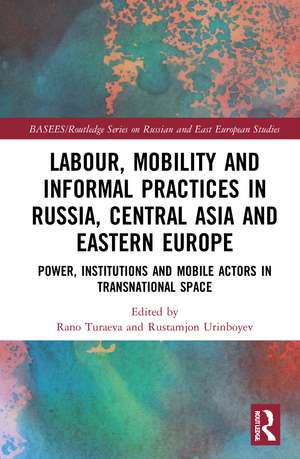Labour, Mobility and Informal Practices in Russia, Central Asia and Eastern Europe: Power, Institutions and Mobile Actors in Transnational Space: BASEES/Routledge Series on Russian and East European Studies
Editat de Rano Turaeva, Rustamjon Urinboyeven Limba Engleză Paperback – 27 mai 2021
| Toate formatele și edițiile | Preț | Express |
|---|---|---|
| Paperback (1) | 387.75 lei 43-57 zile | |
| Taylor & Francis – 27 mai 2021 | 387.75 lei 43-57 zile | |
| Hardback (1) | 1000.27 lei 43-57 zile | |
| Taylor & Francis – 27 mai 2021 | 1000.27 lei 43-57 zile |
Din seria BASEES/Routledge Series on Russian and East European Studies
-
 Preț: 228.19 lei
Preț: 228.19 lei -
 Preț: 311.22 lei
Preț: 311.22 lei - 8%
 Preț: 389.69 lei
Preț: 389.69 lei -
 Preț: 737.43 lei
Preț: 737.43 lei -
 Preț: 309.89 lei
Preț: 309.89 lei -
 Preț: 310.22 lei
Preț: 310.22 lei -
 Preț: 297.39 lei
Preț: 297.39 lei -
 Preț: 326.49 lei
Preț: 326.49 lei -
 Preț: 349.09 lei
Preț: 349.09 lei - 9%
 Preț: 1038.51 lei
Preț: 1038.51 lei - 24%
 Preț: 298.10 lei
Preț: 298.10 lei -
 Preț: 398.18 lei
Preț: 398.18 lei - 18%
 Preț: 1271.75 lei
Preț: 1271.75 lei - 18%
 Preț: 1057.05 lei
Preț: 1057.05 lei - 18%
 Preț: 1059.84 lei
Preț: 1059.84 lei - 18%
 Preț: 1062.26 lei
Preț: 1062.26 lei - 18%
 Preț: 1055.51 lei
Preț: 1055.51 lei - 18%
 Preț: 1057.75 lei
Preț: 1057.75 lei - 18%
 Preț: 1059.84 lei
Preț: 1059.84 lei - 25%
 Preț: 823.63 lei
Preț: 823.63 lei -
 Preț: 487.75 lei
Preț: 487.75 lei - 18%
 Preț: 1005.39 lei
Preț: 1005.39 lei - 18%
 Preț: 1000.76 lei
Preț: 1000.76 lei - 8%
 Preț: 382.79 lei
Preț: 382.79 lei - 18%
 Preț: 1059.84 lei
Preț: 1059.84 lei - 18%
 Preț: 1059.84 lei
Preț: 1059.84 lei - 18%
 Preț: 1009.21 lei
Preț: 1009.21 lei - 18%
 Preț: 1059.84 lei
Preț: 1059.84 lei - 18%
 Preț: 1167.36 lei
Preț: 1167.36 lei - 18%
 Preț: 1060.87 lei
Preț: 1060.87 lei - 30%
 Preț: 771.71 lei
Preț: 771.71 lei - 18%
 Preț: 1059.84 lei
Preț: 1059.84 lei - 18%
 Preț: 1004.20 lei
Preț: 1004.20 lei - 18%
 Preț: 1053.92 lei
Preț: 1053.92 lei - 25%
 Preț: 515.72 lei
Preț: 515.72 lei - 18%
 Preț: 709.01 lei
Preț: 709.01 lei - 25%
 Preț: 823.08 lei
Preț: 823.08 lei - 18%
 Preț: 1103.19 lei
Preț: 1103.19 lei - 18%
 Preț: 1057.75 lei
Preț: 1057.75 lei - 18%
 Preț: 1065.75 lei
Preț: 1065.75 lei - 18%
 Preț: 1055.51 lei
Preț: 1055.51 lei - 26%
 Preț: 850.73 lei
Preț: 850.73 lei - 25%
 Preț: 825.06 lei
Preț: 825.06 lei - 18%
 Preț: 734.50 lei
Preț: 734.50 lei - 26%
 Preț: 821.94 lei
Preț: 821.94 lei - 18%
 Preț: 1062.98 lei
Preț: 1062.98 lei - 18%
 Preț: 1002.63 lei
Preț: 1002.63 lei
Preț: 387.75 lei
Nou
Puncte Express: 582
Preț estimativ în valută:
74.19€ • 77.67$ • 61.39£
74.19€ • 77.67$ • 61.39£
Carte tipărită la comandă
Livrare economică 07-21 aprilie
Preluare comenzi: 021 569.72.76
Specificații
ISBN-13: 9781032010144
ISBN-10: 1032010142
Pagini: 272
Dimensiuni: 156 x 234 x 15 mm
Greutate: 0.41 kg
Ediția:1
Editura: Taylor & Francis
Colecția Routledge
Seria BASEES/Routledge Series on Russian and East European Studies
Locul publicării:Oxford, United Kingdom
ISBN-10: 1032010142
Pagini: 272
Dimensiuni: 156 x 234 x 15 mm
Greutate: 0.41 kg
Ediția:1
Editura: Taylor & Francis
Colecția Routledge
Seria BASEES/Routledge Series on Russian and East European Studies
Locul publicării:Oxford, United Kingdom
Cuprins
Introduction: Labour, Mobilities and Informal Practices in Transnational and Digital Spaces Part I Labour in times of uncertainty 1. The Struggle for Formal Work: The Everyday Experiences of Russia’s Central Asian Labour Migrants 2. Driving in the Shadows: Rural–Urban Labour Migrants as Informal Taxi Drivers in Post-Socialist Tashkent 3. Deportation Regimes in the Post-Soviet Space: Producing Deportable Migrants in the Russian Federation 4. The Migration Infrastructure of Posting: Transnational informality Part II Mobility as blurring national, transnational and digital boundaries 5. Smartphone Transnationalism in Non-Western Migration Regimes: Transnational Ethnography of Uzbek Migrant Workers in Russia 6. Central Asian Female Migrants’ Transnational Social Spaces: Straddling Illegality and Tradition 7. Spiritual Mobility: Alternative Healing Practices amongst Central Asian Migrants in Moscow 8. Roadsides of Mobility: Informal Socioeconomic Strategies in Suburban Western Poland Part III: Informality as state practice dealing with mobility 9. Symbolic State Imagery. Informal State Practice. 10. Informal Practices and the Rule of Law: Russia, Migration and the Arctic Route 11. Ask us decently, and we won’t reject anybody!’ – Providing Informal Healthcare in a Kazakh Medical Space 12. Dual-citizenship, two-fold informality: the interstices of state power and transnational lives amongst Meskhetian returnees in Georgia
Notă biografică
Rano Turaeva is a senior scholar affiliated with the Institute for Social and Cultural Anthropology, Ludwig Maximilian University, Munich and an associated senior researcher at Max Planck Institute for Social Anthropology in Halle Saale in Germany
Rustamjon Urinboyev is an Associate Professor in the Department of Sociology of Law at Lund University and Senior Researcher in Russian and Eurasian Studies in the Aleksanteri Institute at University of Helsinki
Rustamjon Urinboyev is an Associate Professor in the Department of Sociology of Law at Lund University and Senior Researcher in Russian and Eurasian Studies in the Aleksanteri Institute at University of Helsinki
Descriere
This book explores the daily survival strategies of people within the context of failed states, flourishing informal economies, legal uncertainty, increased mobility, and globalization, where many people, who are forced by the circumstances to be innovative and transnational, have found their niches outside formal processes and structures.
